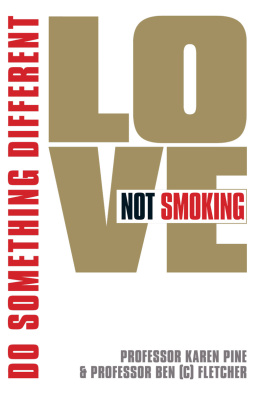Overcoming Your Smoking Habit
The aim of the Overcoming series is to enable people with psychologically based disorders to take control of their own recovery program. Each title, with its specially tailored program, is devised by a practising clinician using the latest techniques of cognitive behavioral therapy techniques which have been shown to be highly effective in changing the way patients think about themselves and their problems.
The series was initiated in 1993 by Peter Cooper, Professor of Psychology at Reading University and Research Fellow at the University of Cambridge in the UK whose original volume on overcoming bulimia nervosa and binge-eating continues to help many people in the USA, the UK and Europe.
Other titles in the series include:
Overcoming Anger and Irritability
William Davies
Overcoming Anorexia Nervosa
Christopher Freeman
Overcoming Anxiety
Helen Kennerley
Bulimia Nervosa and Binge-Eating
Peter J. Cooper
Overcoming Childhood Trauma
Helen Kennerley
Overcoming Compulsive Gambling
Alex Blasczynski
Overcoming Depression (new revised edition)
Paul Gilbert
Overcoming Low Self-Esteem
Melanie Fennell
Overcoming Mood Swings
Jan Scott
Overcoming Panic
Derrick Silove & Vijaya Manicavasagar
Overcoming Social Anxiety and Shyness
Gillian Butler
Overcoming Traumatic Stress
Claudia Herbert & Anna Wetmore
All titles in the series are available by mail order from Constable Robinson Ltd. Please ring 020 8741 3663 for details.
www.constablerobinson.com
OVERCOMING
YOUR SMOKING
HABIT
A self-help guide using
cognitive behavioral techniques
David F. Marks
ROBINSON
London
Constable & Robinson Ltd
5556 Russell Square
London WC1B 4HP
www.constablerobinson.com
First published in the UK by Robinson,
an imprint of Constable & Robinson Ltd 2005
Copyright David F. Marks 2005
All rights reserved. This book is sold subject to the condition that it shall not, by way of trade or otherwise, be lent, re-sold, hired out or otherwise circulated in any form of binding or cover other than that in which it is published and without a similar condition including this condition being imposed on the subsequent purchaser.
The right of David F. Marks to be identified as the author of this work has been asserted by him in accordance with the Copyright, Designs and Patents Act, 1988.
A copy of the British Library Cataloguing in Publication Data is available from the British Library.
ISBN 1-84529-067-4
eISBN 978-1-47210-585-1
2 4 6 8 10 9 7 5 3 1
Important Note
This book is not intended to be substitute for medical advice or treatment.
Any person with a condition requiring medical attention should consult a qualified medical practitioner or suitable therapist.
Printed and bound in the EU.
Contents
Introduction
Why cognitive behavior therapy?
You may have picked up this book uncertain as to why a psychological therapy such as cognitive behavioral therapy could help you overcome your smoking habit. Smoking is a physical addiction, you might think. Cognitive behavioral therapy is for people who have psychological problems, and thats not me. In fact although CBT was developed initially for the treatment of depression, the techniques this therapy uses have been found to be extremely effective for a wide range of problems including compulsive gambling and drug and alcohol addiction. So what is CBT and how does it work?
In the 1950s and 1960s a set of techniques was developed, broadly collectively termed behavior therapy. These techniques shared two basic features. First, they aimed to remove symptoms (such as anxiety) by dealing with those symptoms themselves, rather than their deep-seated underlying historical causes (traditionally the focus of psychoanalysis, the approach developed by Sigmund Freud and his followers). Second, they were techniques, loosely related to what laboratory psychologists were finding out about the mechanisms of learning, which could potentially be put to the test, or had already been proven to be of practical value to sufferers. The area where these techniques proved of most value was in the treatment of anxiety disorders, especially specific phobias (such as fear of animals or heights) and agoraphobia, both notoriously difficult to treat using conventional psychotherapies.
After an initial flush of enthusiasm, discontent with behavior therapy grew. There were a number of reasons for this, an important one of which was the fact that behavior therapy did not deal with the internal thoughts which were so obviously central to the distress that patients were experiencing. In particular, behavior therapy proved inadequate when it came to the treatment of depression. In the late 1960s and early 1970s a treatment was developed specifically for depression called cognitive therapy. The pioneer in this enterprise was an American psychiatrist, Professor Aaron T. Beck, who developed a theory of depression which emphasized the importance of peoples depressed styles of thinking. He also specified a new form of therapy. It would not be an exaggeration to say that Becks work has changed the nature of psychotherapy, not just for depression but for a range of psychological problems.
The techniques introduced by Beck have been merged with the techniques developed earlier by the behavior therapists to produce a therapeutic approach which has come to be known as cognitive behavior therapy. This therapy has been subjected to the strictest scientific testing; and it has been found to be a highly successful treatment for a significant proportion of cases of depression. However it has become clear that specific patterns of thinking are associated with a range of psychological problems and that treatments which deal with these styles of thinking are highly effective. So, effective cognitive behavioral treatments have been developed for anxiety disorders, like panic disorder, generalized anxiety disorder, specific phobias and social phobia, obsessive compulsive disorders, and hypochondriasis (health anxiety), as well as for other conditions such as compulsive gambling, alcohol and drug addiction, and eating disorders like bulimia nervosa and binge-eating disorder. Indeed, cognitive behavioral techniques have a wide application beyond the narrow categories of psychological disorders: they have been applied effectively, for example, to helping people with low self-esteem those with marital difficulties or weight problems, and those who wish to give up smoking.
The starting point for CBT is that the way we think, feel, and behave are all intimately linked; and changing the way we think about ourselves, our experiences, and the world around us, changes the way we feel and what we are able to do. So, by helping a depressed person identify and challenge their automatic depressive thoughts, a route out of a cycle of depressive thoughts and feelings can be found. Similarly, addictive behaviour, such as that associated with smoking, is driven by a nexus of thoughts, feelings and behaviours; and CBT, as you will discover from this book, by providing a means for the addictive behaviour to be brought under cognitive control, enables habitual responses to be undermined and a different kind of life to be possible.
Although effective CBT treatments have been developed for a wide range of problems, they are not widely available; and when people try to help themselves they often make matters worse. In recent years the community of cognitive behavior therapists has responded to this situation. What they have done is to take the principles and techniques of specific cognitive behavior therapies for particular problems and represent them in self-help manuals. These manuals specify a systematic program of treatment which the individual sufferer is advised to work through to overcome their difficulties. In this way, the cognitive behavioral therapeutic techniques of proven value are being made available on the widest possible basis.


















